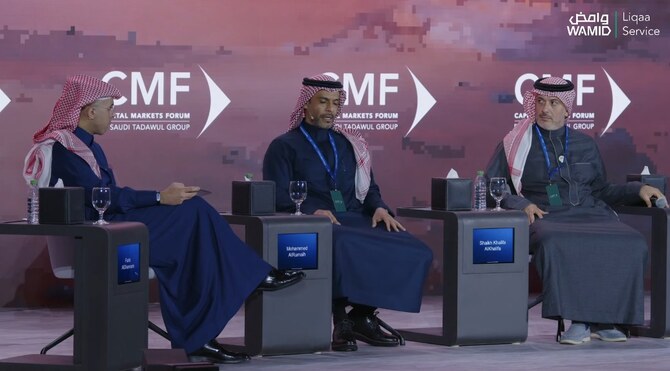RIYADH: Saudi Arabia’s capital market is experiencing rapid growth both regionally and globally, with the Kingdom seeing a surge in initial public offerings on both the main index and the parallel market, Nomu, according to an official.
During a panel discussion at the Capital Markets Forum in Riyadh on Feb. 18, Mohammed Al-Rumaih, CEO of Saudi Exchange, announced that liquidity on the Saudi Exchange has increased by 40 percent compared to 2023.
Al-Rumaih’s remarks came shortly after a report by professional services network EY, which forecasted a positive outlook for IPOs in the Middle East and North Africa region in 2025, with Saudi Arabia poised to lead the way.
“2024 was a great year for us. We did more than 55 listings; around 45 in the equity market, 13 on the main market, which doubled compared to 2023, and the rest in the parallel market. It put us as No.1 not just in the region, but globally as the fastest-growing exchange in the world,” said Al-Rumaih.
He added: “What was great about those listings is that they were well-diversified, different sizes, great stories and it even provided new opportunities for our investors, both local and international. Last year was great, and we expect 2025 to continue the momentum, much bigger and better.”
Al-Rumaih highlighted that Saudi Arabia celebrated the listing of 400 securities in 2024, in addition to the introduction of the capital management system, which he referred to as “one of the great tools we’ve developed.”
“The beauty of this tool is that it made it easier for investors to participate in any IPOs. So, instead of having three receiving banks, now we have 15 which are members of the exchange and that reflected in the subscriptions. For example, subscriptions on Nomu grew by 50 percent,” he added.
Al-Rumaih added that the capital management system also allows lead managers to consolidate listings quickly, and it has reduced the time from closing the book to listing by 50 percent.
“Now, you are more efficient in allocating capital. So, if you close an IPO, you can go to another IPO. You get listed immediately, you can exit and enter another listing. So, all these factors have fueled the growth in our listings,” said Al-Rumaih.
During the panel discussion, Abdulaziz Al-Emadi, acting CEO of the Qatar Stock Exchange, emphasized that developing the capital market is a key goal in the country’s Vision 2030 program.
Al-Emadi further noted that Qatar has established several key performance indicators for capital market growth and is on track to achieve these objectives by the end of the decade.
“The capital market itself has clear KPIs. We should achieve all those KPIs by 2030. Qatar aims to double liquidity, number of listings, and asset management business by 2030. In terms of what we have done in 2024, we did a lot of development in terms of infrastructure. The whole infrastructure has been renewed,” said Al-Emadi.
He added: “Now, we are talking with Tadawul in order to activate our MoU which was signed in the first quarter of 2022 for dual listing.”
Haitham Al-Salmi, CEO of Muscat Exchange said that Oman is trying to move its market toward the Emerging Market category, and it is implementing various initiatives to achieve this goal as a part of Vision 2040.
“We started a strategy of ticking the boxes of all the required market infrastructure to make our market accessible and attractive. In 2024, Oman’s exchange was very active in terms of liquidity boosters and market cap appreciation. We had two listings and one of them was the largest IPO in Oman, bringing $8 billion to the market,” said Al-Salmi.
Shaikh Khalifa Al-Khalifa, CEO of Bahrain Bourse, stated that the country’s capital market is developing steadily and is preparing to list several government-related entities in the near future.
Highlighting the progress of Bahrain’s non-energy private sector, Al-Khalifa also noted that the oil sector now contributes just 15 percent to the country’s GDP, a significant decline from 40 percent a decade ago.
“There is an IPO pipeline which is being led by the government to list some of the GREs in the exchanges, that will drive the private sector into utilizing the listing. So, we all work together to try to promote to increase the liquidity of the market and increase the number of investors,” said Al-Khalifa.
Al-Khalifa added that the GCC Exchanges Committee chaired by the Saudi Exchange is playing a crucial role in ensuring the attractiveness of the markets in the region.
“The GCC Exchanges Committee works in a way that there is less bureaucracy and more action. We meet on a quarterly basis and we entertain ideas. Some of the ideas do not go through, so we move on to other ideas and see what could be possibly be done. The GCC Exchanges Committee also has a short-term vision and a long-term vision,” added Al-Khalifa.
Talking about the vitality of cross-border investments to propel the growth of the capital markets in the region, Al-Salmi said that investment does not have passports, and what matters most is accessibility.
“Investors are looking for good opportunities. They can move across borders easily, and the best thing to do is to collaborate. We have almost signed with most of the GCC markets. We are ready in terms of enabling cross-listings, and it is now part of the issuers to decide to cross-list,” said Al-Salmi.
Al-Emadi said that countries in the GCC region should work further to facilitate the ease of doing business by implementing advanced technology, as well as ensuring market stability to attract investors.
Al-Rumaih said that the exchanges in the GCC are trying as much as possible to harmonize the regulations, adding that capital markets in the region provide huge opportunities for investors, both domestic and international.
“GCC countries have a lot of similarities. We have the political stability and the leadership, as well as the transformation and diversifying away from oil, and the young population,” said Al-Rumaih.














